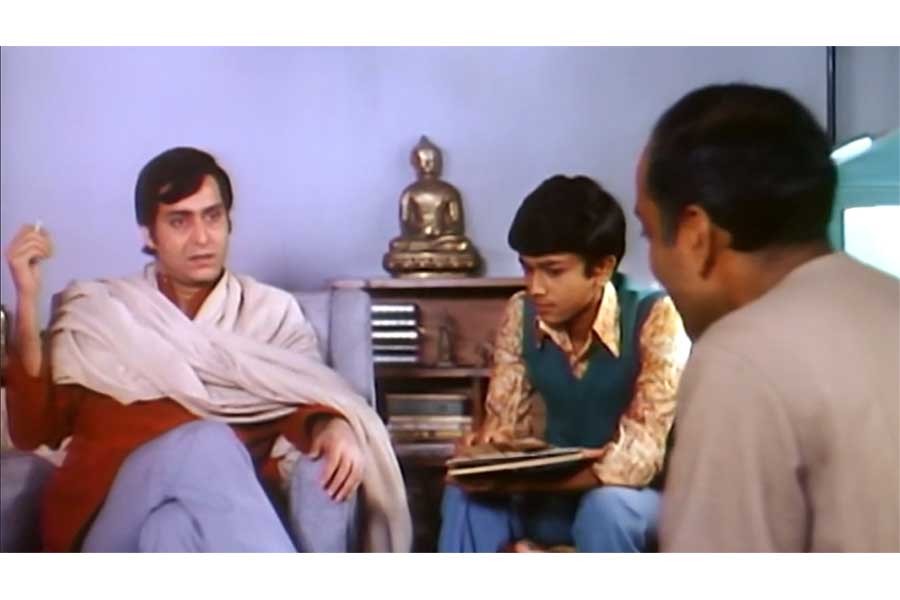“Hoy ami er bodla nebo, noyto goyendagiri chhere debo” (Either I’ll take revenge for this, or else I’ll quit investigating).
This monologue can be said to be one of the most iconic monologues in the history of Bengali detective films from both Bangladesh and West Bengal. If asked, most of the movie lovers will answer without hesitation that this is the monologue of Feluda, from the 1979’s movie ‘Joy Baba Felunath.’
However, it is also well known that Feluda, or in other words, Prodosh Chandra Miter, is not originally a character from a movie.
Feluda has his origin in the pages of Satyajit Ray’s books. To be precise, Feluda made his debut in the book in 1965. It was a novella, and the name was ‘Feludar Goyendagiri’ (Investigation of Feluda).
On the other hand, the movie debut of Feluda happened with the 1974 film, ‘Shonar Kella’ (The Golden Fortress), starring Soumitra Chattopadhyay as Feluda, Shiddhartha Chatterjee as Topse (Feluda’s cousin) and Santosh Dutta as writer Jatayu. Most importantly, the film was directed by Satyajit Ray, who himself created this iconic character.
So, how was the portrayal of Feluda in the movie? Was it book-accurate? Did Satyajit Ray somehow change the avatar of Feluda a bit? Answer to all these questions is matter of discussion.
First, it would be better to compare and contrast the physical presence of Feluda in books and movies (Taking movies directed by Satyajit Ray primarily).
Well, according to the books, Feluda had a height of six feet two inches. On the other hand, Soumitra Chatterjee, who acted as Feluda, had a height of five feet and eleven and a half inches. So, somehow, he looked a bit shorter than the Feluda imagined by the readers.
In the original Shonar Kella book, which was published after six years after the first book of Feluda, theoretically the age of Feluda can be said to be 33 years as he was 27 years old in the first book.
But when the Shonar Kella movie released, Soumitra Chattopdhyay was almost 40 years old then. So, he naturally looked a bit aged than the fictional Feluda character.
Besides, Feluda from the book used to maintain a well-maintained physique through yoga. On the contrary, although Mr Soumitra did not have a burly shape, his body didn’t seem to be well maintained either. Again, the voice of the actor was not also a match to the imagined deep voice of Feluda from the books.
It is said that Satyajit Ray created Feluda in his own shape. Mr Ray had a height of six feet and three inches, and a fairly deep voice, which can be compared only with Feluda himself.
Apart from the physical presence, differences between both the Feludas can also be seen in their movement, thought process, expression of emotions etc. If talked about the movement, in the movies, Mr Soumitra could successfully capture the bodily movements of the book-originated Feluda. Besides, he also had matching getups to strengthen his Feluda image.
But, the thought process of Feluda from the movies somehow clashes with the book's Feluda.
Originally, Feluda is a least-expressive character. He cannot be seen to exclaim with joy, or be burned with anger. But, for example, in Shonar Kella, when the wheel of Feluda’s car bursts, he exclaimed with joy, “Achhe! Achhe! Amader telepathy-r jor ache!” (We do! We do have our power of telepathy!). This childish excitement somehow pushes Mr Soumitra’s Feluda far behind the book’s Feluda.
As one more example, the monologue used in the beginning of the article can be mentioned, which was said out of rage and with a sense of challenge. This type of expression was totally absent in the Joy Baba Felunath book.
So why has Mr Ray made such changes to this iconic character? Well, the most prominent reason behind this change may be to give the character a more ‘human’ image. The Feluda found in the books holds more of a superhuman image with a deep voice, well-shaped body, no extra emotion and expression.
For example, in the climax of ‘Joy Baba Felunath’ book, Feluda can be seen swimming in the Ganga River just to rescue the lion’s head from the Durga statue.
Where, in the film, Feluda is seen just sitting and after the arrival of Maganlaal, threatening him and taking revenge by punishing him. This seems much more real than the book's climax, because here, Feluda is much more human-alike.
Maybe author Satyajit Ray could allow his fictional character to be a bit superhuman-alike, but could director Satyajit Ray do this? Maybe not.
Satyajit Ray, since his very first film ‘Pather Panchali’ (Song of the Road), became renowned for the accurate portrayal of life and living in his films. So, how could such a director bring a superhuman in his film, who is rather better to be imagined while reading books, but cannot be seen in real life?
The side-characters had also changed in the movie. Like, in the illustrations of Shonar Kella novella, which were originally illustrated by Satyajit Ray himself, Lalmohan Ganguly, aka Jatayu, is a short guy with a middle-class look, who sometimes wear spectacles, with a head full of hair and no moustache.
But when we see Santosh Dutta as Jatayu, he is bald, he has moustache and there are no spectacles. And surprisingly, the look of Santosh Dutta became so popular that it was established as the ultimate look of the character. Even today, a fan cannot think of Jatayu without bald head and moustache.
Maganlaal Meghraj from the book Joy Baba Felunath should also be mentioned. In the book’s illustration, he looks chubby and extremely fat. But in the movie under the same title, Maganlaal Meghraj, played by Utpal Dutta, was a moderately healthy man.
However, all of these should be called improvisations, rather than changes. After all, it is a universal truth that, it is the director’s right to show the characters and the story only the way he prefers.


